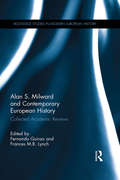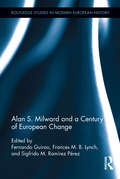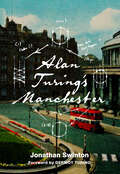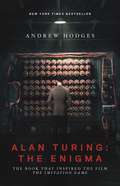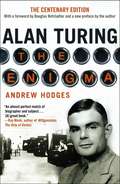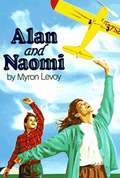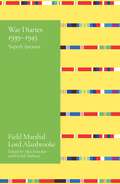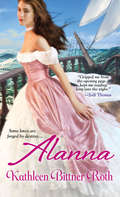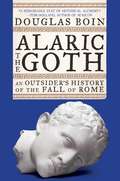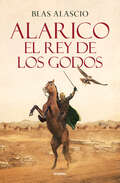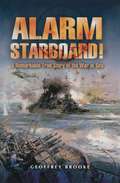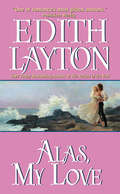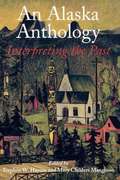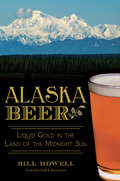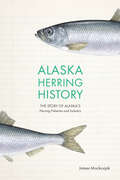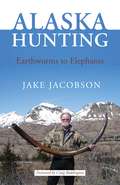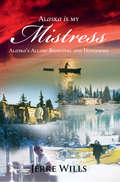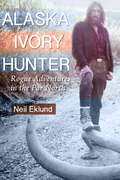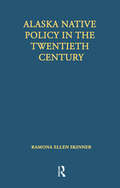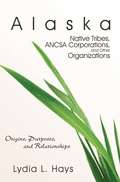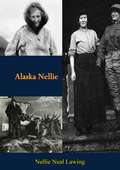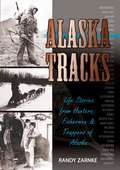- Table View
- List View
Alan S. Milward and Contemporary European History: Collected Academic Reviews (Routledge Studies in Modern European History)
by Frances M.B. Lynch Fernando GuiraoAlan S. Milward was a renowned historian of contemporary Europe. In addition to his books, as well as articles and chapters in edited books, he also wrote nearly 250 book reviews and review articles, some in French and German, which were published in journals world-wide. Taken together they reveal a remarkable degree of theoretical consistency in his approach to understanding the history of Europe since the French Revolution. This book brings together these previously unexamined pieces of historical analysis in order to trace and shed light on key intellectual debates taking place in the second half of the 20th century. Many of these discussions continue to influence us today, such as the role of Germany in Europe, the economic, social and political foundations of European integration, the European rescue of the nation-state, the reasons for launching the single currency, the conditions for retaining the allegiance of European citizens to the notions of nation and supra-nation, and ultimately the issue of democratic governance in a global environment. In bringing together these reviews and review articles, the book provides an introduction to the main scholarly achievements of Milward, in his own words. Fernando Guirao and Frances M.B. Lynch provide an introduction to the volume, which both guides the reader through many of the academic debates embedded within the text while underlining their contemporary relevance. By introducing and bringing together this hitherto overlooked treasure trove of historical analysis, this book maps a close itinerary of some of the most salient intellectual debates of the second half of the 20th century and beyond. This unique volume will be of great interest to scholars of economic history, European history and historiography.
Alan S. Milward and a Century of European Change (Routledge Studies in Modern European History)
by Fernando Guirao Frances M. B. Lynch Sigfrido M. Ramírez PérezThe main purpose of the book is to introduce the work of Alan S. Milward and to acknowledge the full magnitude of his scientific contribution to contemporary British and European history. The book is a collection of essays which provide a better understanding of Alan Milward’s extensive intellectual work for future scholars and facilitate the knowledge and transmission of his published work to present and future generations of students, scholars in the various disciplines concerned, and the general public. The series of original contributions which this book contains are related to or reflect critically upon Milward’s own contributions to the fields of political, diplomatic, and socio-economic history, political science, economics, international relations, and European Studies in general. This book honors Alan Milward through a better understanding of his many pioneering contributions in the fields of contemporary European history in general, and the history of European integration in particular. Although the volume does not aim to be a substitute for Milward’s work itself, it illuminates and assesses his creative process along fifty years of continued and intense work, as well as the impact of his main work, and the continuing relevance of his main theses today.
Alan Turing's Manchester
by Jonathan SwintonAlan Turing is a patron saint of Manchester, remembered as the Mancunian who won the war, invented the computer, and was all but put to death for being gay. Each myth is related to a historical story. This is not a book about the first of those stories, of Turing at Bletchley Park. But it is about the second two, which each unfolded here in Manchester, of Turing’s involvement in the world’s first computer and of his refusal to be cowed about his sexuality. Manchester can be proud of Turing, but can we be proud of the city he encountered?
Alan Turing: The Book That Inspired the Film The Imitation Game - Updated Edition
by Andrew HodgesA NEW YORK TIMES BESTSELLERThe official book behind the Academy Award-winning film The Imitation Game, starring Benedict Cumberbatch and Keira KnightleyIt is only a slight exaggeration to say that the British mathematician Alan Turing (1912–1954) saved the Allies from the Nazis, invented the computer and artificial intelligence, and anticipated gay liberation by decades—all before his suicide at age forty-one. This New York Times bestselling biography of the founder of computer science, with a new preface by the author that addresses Turing&’s royal pardon in 2013, is the definitive account of an extraordinary mind and life.Capturing both the inner and outer drama of Turing&’s life, Andrew Hodges tells how Turing&’s revolutionary idea of 1936—the concept of a universal machine—laid the foundation for the modern computer and how Turing brought the idea to practical realization in 1945 with his electronic design. The book also tells how this work was directly related to Turing&’s leading role in breaking the German Enigma ciphers during World War II, a scientific triumph that was critical to Allied victory in the Atlantic. At the same time, this is the tragic account of a man who, despite his wartime service, was eventually arrested, stripped of his security clearance, and forced to undergo a humiliating treatment program—all for trying to live honestly in a society that defined homosexuality as a crime.The inspiration for a major motion picture starring Benedict Cumberbatch and Keira Knightley, Alan Turing: The Enigma is a gripping story of mathematics, computers, cryptography, and homosexual persecution.
Alan Turing: The Enigma (The Centenary Edition)
by Andrew HodgesIt is only a slight exaggeration to say that the British mathematician Alan Turing (1912-1954) saved the Allies from the Nazis, invented the computer and artificial intelligence, and anticipated gay liberation by decades--all before his suicide at age forty-one. This classic biography of the founder of computer science, reissued on the centenary of his birth with a substantial new preface by the author, is the definitive account of an extraordinary mind and life. A gripping story of mathematics, computers, cryptography, and homosexual persecution, Andrew Hodges's acclaimed book captures both the inner and outer drama of Turing's life. Hodges tells how Turing's revolutionary idea of 1936--the concept of a universal machine--laid the foundation for the modern computer and how Turing brought the idea to practical realization in 1945 with his electronic design. The book also tells how this work was directly related to Turing's leading role in breaking the German Enigma ciphers during World War II, a scientific triumph that was critical to Allied victory in the Atlantic. At the same time, this is the tragic story of a man who, despite his wartime service, was eventually arrested, stripped of his security clearance, and forced to undergo a humiliating treatment program--all for trying to live honestly in a society that defined homosexuality as a crime.
Alan and Naomi
by Myron LevoyWhen Naomi, a refugee child from Nazi-occupied Paris who acts ‘crazy,’ moves into Alan Silverman’s building in New York, he does his best to avoid her. They slowly develop a deep and touching friendship.<P><P> Jane Addams Children’s Book Award Honor Book
Alanbrooke War Diaries 1939-1945: Field Marshal Lord Alanbrooke
by Lord AlanbrookeThe first complete and unexpurgated edition of the war diaries of Field Marshall Lord Alanbrooke - the most important and the most controversial military diaries of the modern era.Alanbrooke was CIGS - Chief of the Imperial General Staff - for the greater part of the Second World War. He acted as mentor to Montgomery and military adviser to Churchill, with whom he clashed. As chairman of the Chiefs of Staff committee he also led for the British side in the bargaining and the brokering of the Grand Alliance, notably during the great conferences with Roosevelt and Stalin and their retinue at Casablanca,Teheran, Malta and elsewhere. As CIGS Alanbrooke was indispensable to the British and the Allied war effort. The diaries were sanitised by Arthur Bryant for his two books he wrote with Alanbrooke. Unexpurgated, says Danchev, they are explosive. The American generals, in particular, come in for attack. Danchev proposes to centre his edition on the Second World War. Pre and post-war entries are to be reduced to a Prologue and Epilogue). John Keegan says they are the military equivalent of the Colville Diaries (Churchill's private secretary), THE FRINGES OF POWER. These sold 24,000 in hardback at Hodder in 1985.
Alanbrooke War Diaries 1939-1945: Field Marshall Lord Alanbrooke
by Lord AlanbrookeThe first complete and unexpurgated edition of the war diaries of Field Marshall Lord Alanbrooke - the most important and the most controversial military diaries of the modern era.Alanbrooke was CIGS - Chief of the Imperial General Staff - for the greater part of the Second World War. He acted as mentor to Montgomery and military adviser to Churchill, with whom he clashed. As chairman of the Chiefs of Staff committee he also led for the British side in the bargaining and the brokering of the Grand Alliance, notably during the great conferences with Roosevelt and Stalin and their retinue at Casablanca,Teheran, Malta and elsewhere. As CIGS Alanbrooke was indispensable to the British and the Allied war effort. The diaries were sanitised by Arthur Bryant for his two books he wrote with Alanbrooke. Unexpurgated, says Danchev, they are explosive. The American generals, in particular, come in for attack. Danchev proposes to centre his edition on the Second World War. Pre and post-war entries are to be reduced to a Prologue and Epilogue). John Keegan says they are the military equivalent of the Colville Diaries (Churchill's private secretary), THE FRINGES OF POWER. These sold 24,000 in hardback at Hodder in 1985.
Alanna (When Hearts Dare #2)
by Kathleen Bittner RothA professional tracker finds unquenchable passion with a mysterious young woman across 19th century America in this historical romance. A legendary tracker of missing persons, Wolf is known from San Francisco to Boston and beyond. His most relentless search of all is for the man who killed his mother when he was only a boy. His dark and feral gaze misses nothing. But now it has fallen on an enigmatic beauty unlike any he has seen before. At first, Wolf tells himself that Alanna Malone is nothing more than a welcome distraction from his work. But soon, he comes to realize that their connection is much deeper than a simple affair. He begins to see her everywhere—across America, across the ocean, even in his dreams. Driven for so long by his passion for revenge, he now finds himself driven by his passion for her…"Gripped me from the opening page. . . kept me reading long into the night." --Jodi Thomas
Alaric the Goth: An Outsider's History Of The Fall Of Rome
by Douglas BoinDenied citizenship by the Roman Empire, a soldier named Alaric changed history by unleashing a surprise attack on the capital city of an unjust empire. Stigmatized and relegated to the margins of Roman society, the Goths were violent “barbarians” who destroyed “civilization,” at least in the conventional story of Rome’s collapse. But a slight shift of perspective brings their history, and ours, shockingly alive. Alaric grew up near the river border that separated Gothic territory from Roman. He survived a border policy that separated migrant children from their parents, and he was denied benefits he likely expected from military service. Romans were deeply conflicted over who should enjoy the privileges of citizenship. They wanted to buttress their global power, but were insecure about Roman identity; they depended on foreign goods, but scoffed at and denied foreigners their own voices and humanity. In stark contrast to the rising bigotry, intolerance, and zealotry among Romans during Alaric’s lifetime, the Goths, as practicing Christians, valued religious pluralism and tolerance. The marginalized Goths, marked by history as frightening harbingers of destruction and of the Dark Ages, preserved virtues of the ancient world that we take for granted. The three nights of riots Alaric and the Goths brought to the capital struck fear into the hearts of the powerful, but the riots were not without cause. Combining vivid storytelling and historical analysis, Douglas Boin reveals the Goths’ complex and fascinating legacy in shaping our world.
Alarico. El rey de los godos
by Blas AlascioLA GRAN NOVELA SOBRE EL ASCENSO AL PODER DE ALARICO, EL REY GODO QUE ACABÓ CON ROMA. UN IMPERIO EN DECADENCIA. UN PUEBLO HUMILLADO Y CON SED DE VENGANZA. BATALLAS, LUCHAS DE PODER Y TRAICIONES EN UN SIGLO CRUCIAL PARA EL DEVENIR DE LA HISTORIA.363 d.C. Tras la batalla de Ctesifonte, Marco Probo decide instalarse en la Dacia, un territorio ocupado por los godos al norte de la frontera del Danubio. Allí, gracias a su trayectoria como militar y filósofo, se convierte en el primer preceptor de Alarico, cuyo nacimiento durante un eclipse ha despertado la leyenda de que será él quien consiga unir a la nación goda y formar el imperio más grande jamás conocido.Sin embargo, Alarico pronto se ve separado de los suyos cuando, tras una cruenta guerra, el emperador Valente impone unas humillantes condiciones al pueblo godo, que pide desperado refugio ante la amenaza de los hunos. Junto con los hijos de otros cincuenta caudillos godos, Alarico es tomado como rehén por el imperio y debe vivir exiliado en Alejandría, Atenas y Constantinopla, ciudades donde será educado entre filósofos. Estos años marcarán su amor por Roma, pero también le convertirán en el más temible de sus enemigos.
Alarm Starboard!: A Remarkable True Story of the War at Sea
by Geoffrey Brooke&“Much more than a mere catalogue of a naval officer&’s experiences of war . . . All-in-all an excellent read and very highly recommended.&” —World Ship Society The author&’s naval war experiences make the most exciting reading. After being mined on the battleship Nelson in 1939, he served on the Prince of Wales, during the Bismarck action, witnessing the sinking of the Hood and Churchill and Roosevelt&’s historic meeting. He survived the disastrous sinking by Japanese dive-bombing in December 1941 but within two days of reaching Singapore, the Island fell. Evacuated in a coastal steamer, only to be sunk the next morning, he was stranded on a deserted island for a week before setting out for Ceylon in a native boat. His epic journey covered 1660 miles and took 37 days. Thereafter his adventures continued, with the North African landings, Russian convoys and, returning to the Far East. He was in the carrier Formidable when she was hit twice by Japanese Kamikazes before VJ Day August 1945.
Alas, My Love
by Edith LaytonFrom the talented Edith Layton comes the second novel in her wonderful new series. Can a self-made man overcome humble beginnings to romance the lady of his dreams? Surviving against all odds, Amyas St. Ives grew up in a foundling home, then escaped to the streets of London and managed, through sheer will and courage, to make his fortune. However, money and devastatingly good looks alone are not enough to gain entry into London high society-not when Amyas is unaware of his true origins and is considered base-born among the posh Regency set. When he meets the alluring Amber, a fellow foundling and ward of a respectable family, he thinks he's met a kindred spirit-but when Amber finally discovers her true identity, the hurdles to their love become insurmountable. How can Amyas convince her family that what a man is matters more than what he was born to be?
Alaska
by Jana HarrisThis saga chronicles the lives and fortunes of four generations of women in the York family, from the Russian occupation of Alaska to the building of the Trans-Alaska Pipeline System. Detailing the triumphs and trials of what became a dynasty of fish and timber barons during a crucial century in Alaska's history, the novel opens with teenage Nadia Karimoff, a half-Russian, half-Native American orphan living in Sitka, being kidnapped and sold to a mysterious Yankee named Noah York.
Alaska Anthology: Interpreting The Past
by Stephen W. Haycox Mary Childers MangussoIn An Alaska Anthology, twenty-five contemporary scholars explore the region's pivotal events, significant themes, and major players, Native, Russian, Canadian, and American. The essays chosen for this anthology represent the very best writing on Alaska, giving great depth to our understanding and appreciation of its history from the days of Russian-American Company domination to the more recent threat of nuclear testing by the Atomic Energy Commission and the influence of oil money on inexperienced politicians. Readers may be familiar with an earlier anthology, Interpreting Alaska's History, from which the present volume evolved to accommodate an explosion of research in the past decade. While a number of the original pieces were found to be irreplaceable, more than half of the essays are new. The result is a fresh perspective on the subject and an invaluable resource for students, teachers, and scholars.
Alaska Beer: Liquid Gold in the Land of the Midnight Sun (American Palate)
by Geoff Larson Bill Howell Marcy LarsonAlaska's fermented legacy retains the fiercely independent spirit that propelled the state's beer drinkers through the gold rush and sustained them through Prohibition. Today, craft brewers produce outstanding suds in some of the harshest and most remote locations on the planet. And while the beer scene in Alaska has roots that trace back to days when spirits had to have "medicinal, mechanical, and scientific purposes," the contemporary crop of breweries can thank industry pioneers like the Alaskan Brewing Company for staying on the cutting edge of beer-making technology. Join beer columnist and historian Bill Howell on an exploration through this hop-filled history of the Last Frontier.
Alaska Dinosaurs, Mammoths, and More
by Kirk Johnson Ray TrollExplore the world of fascinating prehistoric creatures that once roamed ancient Alaska. Packed with vibrant illustrations of dinosaurs by artist Ray Troll and lively text by paleontologist Kirk Johnson, this dynamic picture book is perfect for curious kids ages 8-12 and dinophiles of all ages.This engaging richly illustrated picture book is the perfect introduction to Alaska&’s dinosaurs. It opens with an irresistible, jam-packed map of Alaska fossils, and then proceeds through a timeline of prehistoric creatures that inhabited ancient Alaska&’s oceans and forests.Discover thalattosaurs, giant sea lizards who lived over 200 million years ago, and the mysterious &“desmos,&” a prehistoric marine mammal that looked like a hippo but might be related to horses and rhinos and roamed the region 20 million years ago, and many more!
Alaska Herring History: The Story of Alaska’s Herring Fisheries and Industry
by James MackovjakAlaska Herring History is a thoroughly researched, well-documented, and comprehensive chronicle of Alaska’s herring fisheries. Author James Mackovjak describes the evolution of these fisheries from the late nineteenth century to the present, including harvest, processing, markets, and sustained-yield management considerations. The book is divided into three parts based on the purposes for which herring have been harvested. Part I is a history of the reduction (fertilizer/fish meal/fish oil) and cured (salted) herring industries and the bait-herring fisheries; part II is a history of the roe-herring fisheries in Southeast Alaska, Prince William Sound, Kodiak Island, lower Cook Inlet, Togiak, and Norton Sound; and part III is a history of the herring spawn-on-kelp industry. Historical and contemporary photos and illustrations—as well as graphs and charts that help summarize the development and, in some cases, the demise of the fisheries—augment this detailed look at the evolution of Alaska's herring fisheries. Balancing scientific details, historical facts, and personal anecdotes from experts in the field, Alaska Herring History will be of interest to historians, social scientists, biologists, and fishery managers and makes an important contribution to Alaska fisheries literature.
Alaska Hunting: Earthworms to Elephants
by Jake JacobsonAlaska Hunting: Earthworms to Elephants, a collection of 39 stories, is intended to be seasoning for a Hunters' pie, rural Alaska style. Most hunters extol the charismatic mega fauna, but pursuit of lesser game often takes center stage. Occasionally hunting discoveries lead to other endeavors, from jade mining to gold prospecting and fossil recovery. Possibilities are limitless. As we engage in hunting and fishing pursuits memories are laced with the big ones--the exceptional, genetically endowed giants--but some of the brightest memories are of average representatives of their species. What made them so memorable was the combination of circumstances under which they were taken--or lost. Companions, whether human or animal, often make the hunt memorable and its recollections of trophy quality.
Alaska Is My Mistress: Alaska's Allure-Beautiful and Dangerous
by Jerre WillsJerre Wills was in his late teens when he began feeling something tugging at his shirt-tail, and finally pulling with the force of a 300 pound barn-door halibut heading for deep water on the end of a fishing line. Whatever the powerful pull was, its 5,000 mile beckon, brought the young Wills family to Alaska in March of 1959. First it was the homestead; hunting soon followed; commercial fishing, an improbable occupation became a passion; and becoming a pilot and flying small bush-planes was justified by guiding big game hunters. All of these adventures gave Jerre an appreciation for Alaska's land, sea, and air. Alaska's allure became a 55-year love affair with the Greatland. Alaska Is My Mistress is the story of Jerre Wills' non-stop Alaska seduction.
Alaska Ivory Hunter: Rogue Adventures in the Far North
by Neil EklundThis is a true history of the gift of the many adven- tures I've been able to enjoy in the magnificent state of Alaska. My life in Alaska transitioned from legal exciting and wild exploits to what has still been a life full of adventure, but a life that was at the edge of the law. Alaska is an immense wilderness. It doesn't need federal protection. It needs to be left under state control so that its bountiful resources can be harvested and developed responsibly as the state has always done. Federal interference in the affairs of Alaska, which already has a great state govern- ment, has actually had a terribly negative influence on all the people of Alaska.
Alaska Native Policy in the Twentieth Century (Native Americans: Interdisciplinary Perspectives)
by Ramona Ellen SkinnerFirst published in 1998. Routledge is an imprint of Taylor & Francis, an informa company.
Alaska Native Tribes,ANCSA Corporations, and Other Organizations: Origins, Purposes, and Relationships
by Lydia HaysLearn about Alaska's unique indigenous people who have lived thousands of years in a subsistence economy and unconquered. See how today's Alaska Native people exhibit remarkable resilience and adaptability despite the arrival of foreigners to Alaska in the mid-1700s, who sought natural resources and brought death and disease that claimed many indigenous lives. Clear descriptions, facts, charts, lists, and maps tell about the 230 Alaska Native tribes and more than 350 Alaska Native-owned for profit and nonprofit organizations that have emerged over the past 65 years. A stunning 25,000 year timeline depicts archeological sites which helped provide the basis for aboriginal land rights in the historic Alaska Native Land Claims Settlement in 1971. Today, Alaska Native people comprise about 20 percent of Alaska's population and their institutions are a major player in Alaska's diverse economy. Easy to read, you will gain an essential understanding about these modern institutions that have been successfully integrated with traditional subsistence values and are improving the lives of Alaska Native people and all of Alaska.
Alaska Nellie
by Nellie Neal LawingNOT A GHOST WRITTEN ROMANCE…but the true story of an Alaskan pioneer who went North as a young girl during the exciting days of the development of the Alaskan Railroad. Offers of publishers to edit her copy and rewrite the book were repeatedly rejected in order that the story might be told accurately and the true sentiment of the writer in these later years be conveyed to the reader.Leaving gunfire and bloodshed in the rowdy mining camps of Cripple Creek, Colorado, Alaska Nellie—without friends or even acquaintances to turn to for advice or help—travelled along to the strange land that was then truly a frontier.The hardships she endured, the cold and hunger, miles of travel on foot, pulling a sled without the aid of dogs, the dangers she encountered and kind assistance she gave to those in need have made her name one that is known and loved throughout the entire territory.Everyone will enjoy this thrilling story of one of the few woman pioneers who lived to “carry on.”
Alaska Tracks: Life Stories from Hunters, Fisherman and Trappers of Alaska
by Randall ZarnkeAuthor and historian Randy Zarnke has compiled a collection of irreplaceable stories of long-time Alaskans who have lived lives most of us can only dream of. Truly remarkable men, like Jim Rearden and Red Beeman, are the kinds of outdoorsmen who have given back more than they have ever taken, furthering the causes of conservation and fair chase hunting through exemplary lives. Rearden, a long-time member of the Alaska Board of Game and one of the founders of the wildlife management program at the University of Alaska, is the dean of Alaska outdoor writers and authors. His writings have always counseled the "wise use" of natural resources and he has never back down from slamming the spoilers who are motivated only for quick profit. Red Beeman is a master guide, schooled in the old traditions of fair chase hunting. Never one to blow his own horn, Beeman provided his hunters with first class excursions; his clients safe in knowing their trophies would be handled professionally, all the meat salvaged and cared for expertly, and no better fair chase hunt could be found in Alaska. These men, and others, in Randy's book are sadly fading from the scene and it is a joy to know that at least a little of their stories will be preserved for future generations to emulate and learn from."
